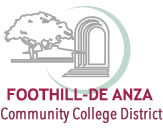Chancellor Search
The Position | District Overview | Foothill College | De Anza College | Commitment to Equity | Institutional Excellence and Innovation | District Budget | Expectations of the Chancellor | Opportunities and Challenges | Desired Attributes | Qualifications | Nominations and Applications
Expectations of the Chancellor >

The Position
The Board of Trustees of the Foothill-De Anza Community College District invites nominations and applications from exceptional leaders for the position of chancellor of the district. The successful candidate in this national search will succeed Dr. Judy Miner, a widely recognized advocate for community colleges, who is retiring after 35 years at the district and 8 years as chancellor.
One of the largest community college districts in California and the nation, Foothill-De Anza includes Foothill College in Los Altos Hills, De Anza College in Cupertino, and the Sunnyvale Center, operated by Foothill College, in Sunnyvale. Publicly supported and locally oriented, the district, in addition to preparing students for university transfer, fills an essential role in workforce development to meet the changing demands of surrounding high-tech communities and is a longstanding leader in online education and innovation. Approximately 50,000 students and 1,800 faculty and staff enjoy an unparalleled quality of life in an ideal climate, with physically beautiful and fiscally sound campuses that have earned a global reputation for excellence.
Occupying more than 100 buildings on 200 acres in Silicon Valley, the Foothill-De Anza district is well positioned to partner successfully with companies, government agencies and nonprofit organizations in Santa Clara County and beyond. As chief executive officer of the district, the next chancellor will work with the presidents of the two colleges on an ambitious agenda to take the district to the next level of excellence and innovation.
By every measure, this is a phenomenal career opportunity.
District Overview
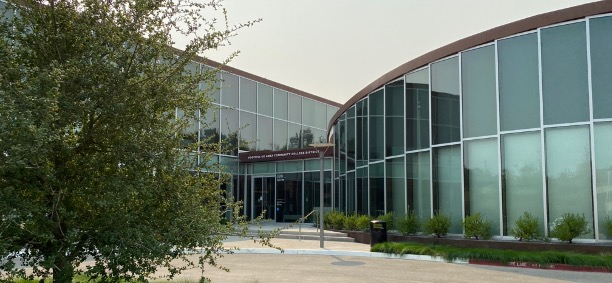
The Foothill-De Anza Community College District consists of two colleges and an education center located in the heart of Silicon Valley, just four miles from Stanford University and 30 miles south of San Francisco. The district is part of the California Community Colleges system, which has 116 colleges in 73 districts serving more than 1.8 million students, making it the largest system of higher education in the United States.
The mission of the Foothill-De Anza Community College District is student success. We are driven by an equity agenda and guided by core values of excellence, inclusion, and sustainability. Every member of our district contributes to a dynamic learning environment that fosters student engagement, equal opportunity, and innovation in meeting the various educational and career goals of our diverse students. We are committed to providing an accessible, quality undergraduate education dedicated to developing a broadly educated and socially responsible community that supports an equitable and just future for California.
A seven-member board of trustees governs the district. Voters from five geographic areas within the district’s boundaries elect five trustees, and two student trustees, representing each of the colleges, serve in an advisory capacity. The district has a long history of electing professional, policy driven board members. Encompassing the Santa Clara County communities of Cupertino, Los Altos, Los Altos Hills, Mountain View, Palo Alto, Stanford, Sunnyvale and parts of Saratoga and San Jose, the district has a population of more than 450,000 residents. More than 1 million students have attended the colleges since the opening of Foothill College in 1958 and De Anza College in 1967.
The Board of Trustees is deeply committed to equity and has adopted priorities directed toward eliminating structural racism and systemic inequities deemed critical in eliminating equity gaps, enhancing student social and emotional well-being and success, and reenvisioning the campuses.
Foothill-De Anza has a long and productive tradition of participatory governance. The Chancellor’s Advisory Council, comprised of faculty, staff and student leaders, is the main governance group that advises the chancellor on institutional planning, budgeting, and policy and procedures.
Foothill-De Anza enjoys strong support from a community that values and respects quality education. In 1999, 2006, and 2020, voters overwhelmingly approved district general obligation bond measures that have generated approximately $1,636.8 billion for new construction, modernization and other capital improvements, including new technology that resulted in significant upgrades to the campuses. The $898 million bond measure approved in 2020 will fund improvements and renovations, investments in employee and student housing, and a new student services building and event center at De Anza College.
Local residents also serve on the district’s bond oversight committee, audit and finance committee, and nonprofit foundation, which has more than $58 million in assets and raises between $3 million and $5 million annually for direct student support and program support at the colleges. An initiative launched by the foundation in fall 2021 aims to raise $3 million in three years to support student basic needs — food, housing, and mental health.
Foothill College
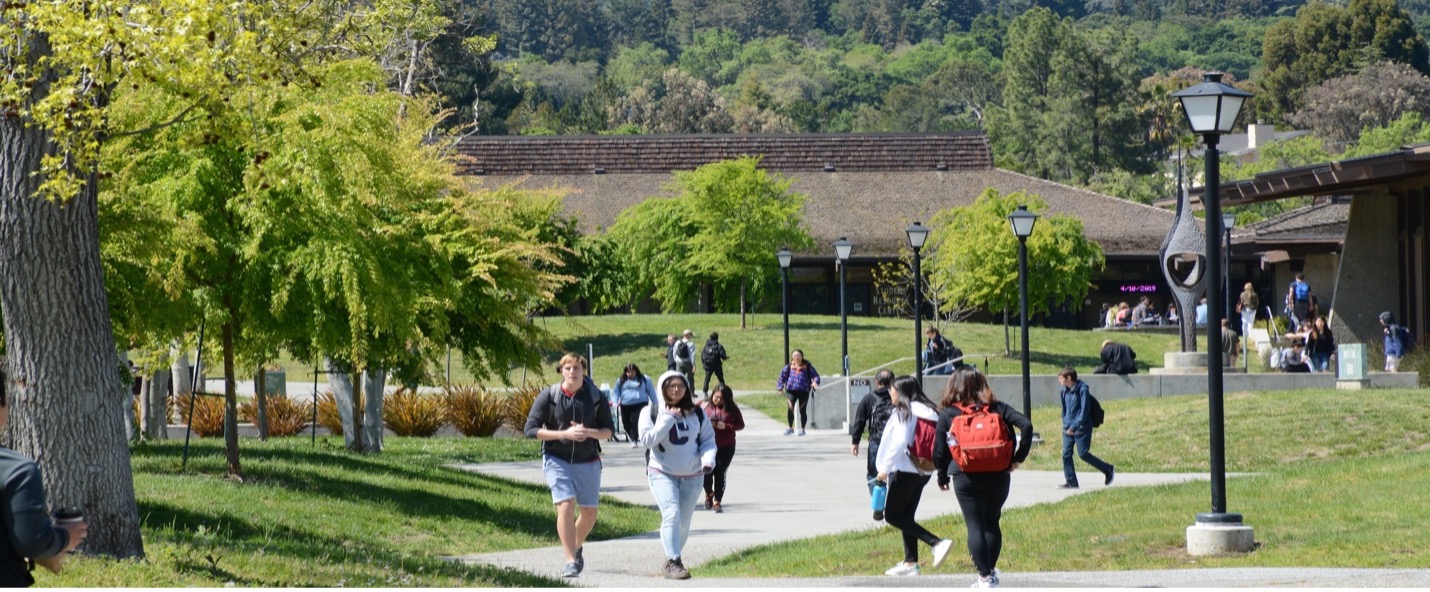
Foothill College has a long-standing national reputation for teaching excellence and innovation. Founded In 1957 with a commitment to “educational opportunity for all,” the serene campus in Los Altos Hills rests on 122 acres of rolling foothills and has been called “the most beautiful community college ever built” by the San Francisco Chronicle. In addition to its main campus, the college operates an educational center in Sunnyvale, which serves as a regional hub for training and internships.
The first community college in California to offer an online course for credit, Foothill College now offers more than 40 fully online associate degree programs and approximately 300 online course sections as part of its commitment to multiple modality options for students. Even before the transition to online education necessitated by the pandemic, more than 50% of the college’s enrollment was online. Foothill College has long been recognized as a statewide and national community college leader in online education.
Foothill College has achieved state, regional and national acclaim for its numerous high-quality academic programs, including a bachelor’s degree in dental hygiene, innovative apprenticeship partnerships and career programs. A second bachelor’s degree program in respiratory care has recently been approved. The college hosts a Middle College and an extensive dual enrollment program and is currently building on strengths in digital education, experiential learning, and institutional transformation.
Foothill College faculty are nationally recognized for their excellence in the classroom and educate approximately 25,000 day, evening and online students annually. Students may choose from 82 associate degree programs and 108 certificate programs or take classes in preparation for transfer to another college or university.
Foothill consistently ranks among the top transfer institutions in the state. Approximately 1,000 Foothill students transfer annually to the University of California and California State University systems, and about 400 students each year transfer to private and out-of-state institutions including MIT, Stanford University, University of Southern California, Cornell University and Georgetown University. In 2022, the college awarded 1,003 associate degrees, 1,145 credit certificates and 76 bachelor’s degrees.
Foothill faculty, staff and administrators are guided by core values of honesty, integrity, trust, openness, transparency, forgiveness, and sustainability in working to achieve the institution’s mission statement: Believing a well-educated population is essential to sustaining and enhancing a democratic society, Foothill College offers programs and services that empower students to achieve their goals as members of the workforce, as future students, and as global citizens. We work to obtain equity in achievement of student outcomes for all California student populations.
De Anza College
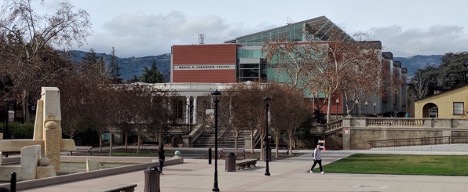
De Anza College is an institution driven by its vision to empower all students to attain their educational goals, develop an equity-based mindset and become civic leaders in their communities. Employees embrace the college mission to provide an academically rich, multicultural learning environment that challenges students of every background to develop their intellect, character and abilities; to realize their goals; and to be socially responsible leaders in their communities, the nation and the world.
The college serves nearly 30,000 students annually, providing the opportunity to earn an associate degree in 70 fields of study or one of 95 certificates. The college has also gained authorization to offer a bachelor’s degree program in automotive technology management. De Anza is consistently at or near the top statewide in transfers to four-year institutions, with more than 2,500 students transferring each year to campuses of the University of California and California State University and hundreds more heading to private and out-of-state institutions. The college also boasts award-winning career training programs recognized for helping students make financial and employment gains. In 2022, the college awarded 2,225 associate degrees, 1,029 credit certificates, and 41 noncredit certificates.
Students attending De Anza discover a diversity of people representing cultures from around the world and learn how to become fully engaged, politically aware citizens. The Vasconcellos Institute for Democracy in Action helps advance these goals. The college also provides the full college experience. Students can join one of 76 campus clubs or start a new one; write for the award-winning campus newspaper, La Voz; visit the California History Center, Fujitsu Planetarium, Cheeseman Environmental Study Area and the Euphrat Museum of Art; or participate on one of 17 intercollegiate athletics teams.
Learning at De Anza College happens in state-of-the-art facilities, nine of which are LEED certified, including one LEED Silver and two LEED Platinum buildings. A regional asset to the community, De Anza neighbors and future students participate in Community Education programs, including not-for-credit, fee-based short courses and the De Anza College Academy, which provides year-round and special interest enrichment classes for elementary, middle school, and high school students.
Commitment to Equity
Equity, diversity and inclusion are core values of the Foothill-De Anza Community College District. The district is committed to helping all members of its community succeed by providing a supportive educational and work environment that is free from discrimination and that actively works to eliminate structural racism. All major planning efforts address student equity, including program review, resource allocation, accreditation, and strategic and educational master planning.
The district’s governing board adopted a set of priorities intended to eliminate structural racism and achieve equity and student success goals, including the development of a shared understanding of the need for change, identification and monitoring of student equity and success goals, development of budgets that increase investments in intentional strategies designed to achieve student success and equity goals, and the identification and dismantling of systemic inequities and elements of institutional racism in district policies and practices. The goals of the chancellor and presidents align with the priorities adopted by the trustees. Reports of progress in reaching the goals are publicly presented twice per year.
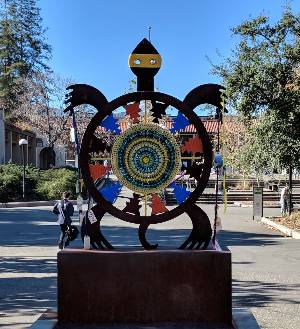 De Anza College’s Equity and Engagement Division offers programming aimed at addressing
inequities in higher education, providing resources to help students overcome social
barriers, and preparing students to become active participants and leaders in a democratic
society. The college’s Equity Plan Re-imagined 2022-2027 reflects feedback gleaned from participatory governance groups and strategic planning
sessions to inform the development of the college’s new student equity and educational
master plans.
De Anza College’s Equity and Engagement Division offers programming aimed at addressing
inequities in higher education, providing resources to help students overcome social
barriers, and preparing students to become active participants and leaders in a democratic
society. The college’s Equity Plan Re-imagined 2022-2027 reflects feedback gleaned from participatory governance groups and strategic planning
sessions to inform the development of the college’s new student equity and educational
master plans.
Foothill College’s Office of Equity and Inclusion is committed to developing and supporting a culture of equity that promotes student success, particularly for underserved students. The college’s Strategic Vision for Equity 2021-2025 provides a sustainable and systemic vision for achieving equity through eliminating demographically predictable disparities. Implementation teams ensure the issues and goals identified in the strategic vision are addressed across the entire campus and at all levels of the institution.
Foothill-De Anza welcomes and unites people of all ethnicities, genders, sexual orientations, socioeconomic classes, religions, abilities and ages, and empowers them as individuals and as groups. The district regularly reviews its record of equity and diversity in employment and believes that culturally diverse teams yield more creative, synergistic and effective outcomes.
Institutional Excellence and Innovation

Foothill-De Anza is nationally recognized for its contributions to research about community college students and best educational practices, and faculty and staff frequently make presentations at state, national and international conferences. The district’s Office of Institutional Research & Planning works closely with the colleges to support data-driven decisions that maximize opportunities for student success.
Foothill-De Anza was selected in a competitive process in 2013 by the California Community Colleges Chancellor’s Office to lead a statewide Online Education Initiative (OEI) to increase transfer and degree completion among California community college students. Following a remarkably successful launch, the district continues to manage what is known now as the California Virtual Campus-Online Education Initiative (CVC-OEI). The state-funded collaborative, which has received more than $200 million in funding to date, offers access to quality online courses and robust support services for students, faculty members and classified professionals across the state. CVC-OEI was key in helping the statewide system accelerate the transition to online learning and student services during the pandemic.
Foothill was one of 15 colleges in California chosen by the California Community Colleges Board of Governors to offer a baccalaureate degree in dental hygiene as part of a pilot program authorized by the California Legislature in 2014. Based on the statewide program’s success, the Legislature made the pilot program permanent and authorized its expansion in 2022. Foothill has since received approval to offer a second bachelor’s degree in respiratory care, and De Anza has been authorized to offer a four-year degree in automotive technology management.
The district is a leader in environmental sustainability, and its 2021 Energy Management Plan sets ambitious goals for carbon neutrality and energy savings. In 2008, De Anza’s Kirsch Center for Environmental Studies, which serves as a demonstration building for energy innovation and sustainability, became the first community college building in the nation to receive LEED Platinum certification. The district now has 10 LEED-certified buildings, offering students, faculty and staff an optimal teaching and learning environment. Extensive photovoltaic arrays at both campuses have reduced district energy costs by about $1 million a year. Measure G bond projects include new facility construction, major renovations of existing facilities, and energy-saving retrofits for existing lighting, HVAC, and central plant systems.
Funded by a $1.833 million grant from the Mellon Foundation, the districtwide Foothill-De Anza Humanities Mellon Scholars program funds enrichment activities, applied learning opportunities, and support services designed to increase the transfer success. Students in the program have designated faculty advisors, financial support for the purchase of textbooks and other course material, and paid internships that allow them to apply the knowledge and problem-solving abilities gained through their humanities course study.
The U.S. Department of Education awarded a $2.25 million grant to De Anza College under the Title III “Strengthening Institutions Program” after the college submitted an application titled “Meeting Students Where They Are: Culturally Responsive Cohort-Based Models to Improve Student Outcomes.” The grant allows the college to better serve its diverse student population by coordinating delivery of many student services through the Guided Pathways Villages, expanding Learning Communities, and creating a new Ethnic and Pride Inclusion Center for historically underserved students, including LGBTQ+ students. The college’s Guided Pathways Villages initiative was recognized with an Exemplary Program Award by the California Community Colleges Board of Governors.
The Foothill College Science Learning Institute (SLI) is an innovative instructional model that draws on educational research and best practices to support successful teaching and learning of STEM-related content. The SLI was founded in an environment of collaboration and innovation, allowing dedicated faculty members to teach, inspire and transform how STEM subjects are taught and learned. A key objective is to bring more students into STEM from historically underrepresented groups. In addition to increasing university transfer rates, the institute prepares students for work in fields such as biomedical devices, rapid prototyping, nanotechnology and renewable energy systems. The SLI has been strengthened by partnerships with the Bill & Melinda Gates Foundation’s Global Skills for College Completion, the Carnegie Foundation’s Statway project, and the National Science Foundation’s STEMway and nanotechnology projects.
The Krause Center for Innovation (KCI) is a regional center that empowers Silicon Valley educators and students to use technology in the classroom to increase student success. Since it opened in 2000, the center, which serves as both an instructional space and a laboratory for exploration and learning, has trained more than 25,000 local elementary, middle and high school teachers from throughout the Bay Area and Southern California. The KCI’s goal is to spread its transformative learning practices throughout California.
The Foothill-De Anza district is a founding member of the League for Innovation in the Community College and has continuously maintained its position as a member of the Board of Directors, one of only two California districts on the board.
District Budget
The Foothill-De Anza Community College District has a long history of fiscal strength maintained through careful planning and prudent fiscal practices. The district’s 2022-2023 budget includes $208.1 million in unrestricted general fund revenue. A strong stability fund balance has offset shortfalls for many of the last few fiscal years and has also provided for strategic deficit spending during budget reductions, allowing a longer planning time to minimize layoffs and other impacts.
With a AAA rating from Standard and Poor’s and Aaa from Moody’s, the district refinanced outstanding general obligation bonds in 2021 producing savings of $26.6 million to district taxpayers and reducing annual debt costs by $1.33 million.
A multiyear trend of declining resident and nonresident enrollment presents a challenge to maintaining fiscal stability. The district anticipates remaining under state “hold harmless” funding, which has insulated the district’s budget from the enrollment decline, until the 2024-25 fiscal year. After this time, barring any increases to base funding or specific budget allocations, the district would need to grow its enrollment and improve its supplemental and student success metrics under the Student Centered Funding Formula in order to increase its revenue allocation from the state.
This website includes the following sections:
- Position Announcement
- Expectations of the Chancellor
- How to Apply
- Timeline
- Search Committee
- Search Updates
